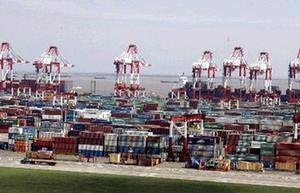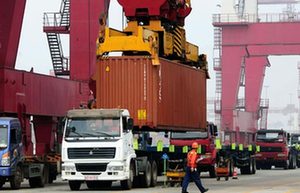The floating farms, which cast 1 sq km grid nets that carpet the bay, primarily produce clams, shrimps and sea cucumbers, which contributed 14.5 billion yuan to the city's marine economy last year, says Yu Chengpu, director of Qingdao Ocean and Fisheries Bureau.
Qinhuangdao port, the seventh-busiest in the world, is a labyrinth of shipping containers, stacked five to seven units high, towering over the raised highway pass leading to the main entry gate.
For international business, Qingdao is China's second-busiest port, after Shanghai, importing goods such as cars from Japan and South Korea, ore from Africa and India and soybeans from the United States, Yao says.
It is also China's largest coal shipping port and top crude oil port, playing a pivotal role distributing the largest sources of energy in the country.
Yao says the port will come into play when attracting investors, domestic and international, for the launch of its initial public offering in the "near future". The date has yet to be set, and port authorities are not ready to announce details.
Completing the Silk Road circuit, inland transport will provide access for provinces as far away as the Xinjiang Uygur autonomous region and allow Qingdao to act as the port of origin for Chinese exports to countries in Central Asia such as Kazakhstan and Kyrgyzstan.
"This also includes the export of our local goods," Yao says, noting that the city is home to Haier Group, China's largest international home appliance company.
In the central business district the city is drawing on its position as a gateway to China to attract investment from overseas companies.
With more than 11,000 foreign-funded companies, most of them Japanese and South Korean, but with access to 114 of the world's Fortune 500 companies, international trade has become a crucial component in helping fund expansion.
Foreign companies generated 40 percent of the city's tax revenue last year.
As the city aims to increase its standing as an international trading city, it is now looking at plans for a free-trade port geared toward attracting more business from Asian countries.
Even as the city looks to the sea to make money, it is also employing top minds to find inspiration and innovation beneath the waves.
Blue Silicon Valley, which drew initial investment of more than 40 billion yuan, has been one of Qingdao's answers to the national call for innovation. In the area, covering about 580 square kilometers of the city, more than 70 projects, ranging from technology development to research, most with a nautical theme, are being built.
"The areas we are concentrating on are marine biology, seawater resource exploration, new materials and renewable energy, oceanographic instruments and marine equipment manufacturing," says the city's Party chief Li.
Facilities such as the National Laboratory for Oceanic Science and Technology, expected to be completed this year, and the National Deep Sea Base, expected to open late next year, will be the venues for some of the most up-to-date oceanic research in the country.
"Half of the country's top marine scientists work in the city and have won half of China's marine innovation awards," says Liu Mingjun, deputy mayor of Qingdao.
|
 |
 |
| Robust growth at Shanghai port | Qingdao Port: Shipments unaffected by investigation |
